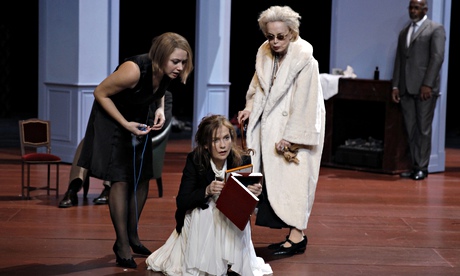
Isabelle Huppert, a veteran of some 90 films, is also a highly skilled stage actor. If there were any doubt of the matter, she gives a sensational performance in Luc Bondy's stylish, modern-dress production of Marivaux's complex comedy.
It helps, of course, that Marivaux's 1737 play, little known in Britain but beautifully translated by Timberlake Wertenbaker in 1983 as False Admissions, is a masterly study in deception and self-deception. Huppert plays Araminte, a wealthy, somewhat self-preoccupied widow: a point made in Bondy's production by Araminte's obsessive tai-chi workouts and vast Imelda Marcos-like collection of shoes.
The play's action revolves around a cunning stratagem in which Araminte is tricked into falling in love with her young, penniless steward, Dorante. There is a palpable cruelty to the plan, involving Dorante's supposed passion for Araminte's personal assistant, that shows Marivaux anticipating by half a century the chess-like manoeuvres of Les Liaisons Dangereuses.
It is, in short, an immensely subtle play in which sex, money and class intersect. What is startling about Bondy's production, however, is Huppert's portrayal of a woman derailed by desire. Her Araminte starts in total control of her destiny: her desk is crammed with law-books, which she stuffs with banknotes that she deploys as bribes. But Huppert, a pencil-slim figure in silky Dior suits, totters slightly on first seeing the handsome Dorante.
What follows is a compelling portrait of a woman poleaxed by a passion she is terrified to declare. Huppert lapses into exaggerated laughter when told Dorante is madly in love with her, becomes nervously skittish in his presence and, in one great scene, fights the urge to throw herself at him while dictating a letter in which she agrees to marry a neighbouring count.
Huppert acts with every inch of her being and, on realising Dorante is about to declare his love, revealingly kisses her own image in the mirror. Even if it is very much Huppert's evening, there is good support from Louis Garrel as the devious Dorante, Bulle Ogier as Araminte's bullying mother and Manon Combes as the smiling PA who is deluded into believing she is the object of Dorante's desire. One comes out admiring yet again Marivaux's psychological astuteness and the ability of modern directors to get beyond the idea that his plays depend simply on high-flown verbal style.
I just wish British audiences had the chance to savour Huppert's performance, which offers as unflinching a portrait of the disorderly nature of love as you could hope to see.
• Did you catch this show – or any other recently? Tell us about it using #gdnreview

